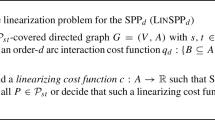Abstract
We use the recently introduced advising scheme framework for measuring the difficulty of locally distributively computing a Minimum Spanning Tree (MST). An (m,t)-advising scheme for a distributed problem ℘ is a way, for every possible input I of ℘, to provide an “advice” (i.e., a bit string) about I to each node so that: (1) the maximum size of the advices is at most m bits, and (2) the problem ℘ can be solved distributively in at most t rounds using the advices as inputs. In case of MST, the output returned by each node of a weighted graph G is the edge leading to its parent in some rooted MST T of G. Clearly, there is a trivial (⌈log n⌉,0)-advising scheme for MST (each node is given the local port number of the edge leading to the root of some MST T), and it is known that any (0,t)-advising scheme satisfies \(t\geq\tilde{\Omega}(\sqrt{n})\). Our main result is the construction of an (O(1),O(log n))-advising scheme for MST. That is, by only giving a constant number of bits of advice to each node, one can decrease exponentially the distributed computation time of MST in arbitrary graph, compared to algorithms dealing with the problem in absence of any a priori information. We also consider the average size of the advices. On the one hand, we show that any (m,0)-advising scheme for MST gives advices of average size Ω(log n). On the other hand we design an (m,1)-advising scheme for MST with advices of constant average size, that is one round is enough to decrease the average size of the advices from log n to constant.
Similar content being viewed by others
References
Chin, F., Ting, H.F.: An almost linear time and O(nlog n+e) messages distributed algorithm for minimum-weight spanning trees. In: Proc. 26th IEEE Symp. on Foundations of Computer Science (FOCS), pp. 257–266 (1985)
Cohen, R., Fraigniaud, P., Ilcinkas, D., Korman, A., Peleg, D.: Labeling schemes for tree representation. In: Proc. 7th International Workshop on Distributed Computing (IWDC), pp. 13–24 (2005)
Cohen, R., Fraigniaud, P., Ilcinkas, D., Korman, A., Peleg, D.: Label-guided graph exploration by a finite automaton. In: 32nd Int. Colloquium on Automata, Languages and Programming (ICALP). LNCS, vol. 3580, pp. 335–346. Springer, Berlin (2005)
Cormen, T.H., Leiserson, T., Rivest, R.L.: Introduction to Algorithms. MIT Press/McGraw-Hill, New York (1990)
Elkin, M.: A faster distributed protocol for constructing a minimum spanning tree. In: Proc. ACM-SIAM on Discrete Algorithms (SODA), pp. 352–361 (2004)
Elkin, M.: An unconditional lower bound on the hardness of approximation of distributed minimum spanning tree problem. In: Proc. 36th Annual ACM Symp. on Theory of Computing (STOC), pp. 331–340 (2004)
Fraigniaud, P., Ilcinkas, D., Pelc, A.: Oracle size: a new measure of difficulty for communication tasks. In: Proc. 25th Annual ACM Symposium on Principles of Distributed Computing (PODC), pp. 179–187 (2006)
Fraigniaud, P., Ilcinkas, D., Pelc, A.: Tree exploration with an oracle. In: 31st Int. Symp. on Mathematical Foundations of Computer Science (MFCS). LNCS, vol. 4162, pp. 24–37. Springer, Berlin (2006)
Gafni, E.: Improvements in the time complexity of two message-optimal election algorithms. In: Proc 4th ACM Symp. on Principles of Distributed Computing (PODC), pp. 175–185 (1985)
Gallager, R.G., Humblet, P.A., Spira, P.M.: A distributed algorithm for minimum-weight spanning trees. ACM Trans. Program. Lang. Syst. 5, 66–67 (1983)
Korman, A., Kutten, S.: Distributed verification of minimum spanning trees. In: Proc. 25th Annual Symposium on Principles of Distributed Computing (PODC), pp. 26–34 (2006)
Korman, A., Kutten, S., Peleg, D.: Proof labeling schemes. In: Proc. 24th Annual Symposium on Principles of Distributed Computing (PODC), pp. 9–18 (2005)
Kuhn, F., Moscibroda, T., Wattenhofer, R.: What cannot be compute locally! In: Proc. 23th ACM Symp. on Principles of Distributed Computing (PODC), pp. 300–309 (2004)
Linial, N.: Locality in distributed graph algorithms. SIAM J. Comput. 21(1), 193–201 (1992)
Lotker, Z., Patt-Shamir, B., Peleg, D.: Distributed MST for constant diameter graphs. In: Proc. 20th ACM Symp. on Principles of Distributed Computing (PODC), pp. 63–72 (2001)
Lotker, Z., Pavlov, E., Patt-Shamir, B., Peleg, D.: MST construction in O(log log n) communication rounds. In: SPAA ’03: Proceedings of the Fifteenth Annual ACM Symposium on Parallel Algorithms and Architectures, pp. 94–100 (2003)
Naor, M., Stockmeyer, L.: What can be computed locally? In: 25th ACM Symposium on Theory of Computing (STOC), pp. 184–193 (1993)
Peleg, D.: Distributed Computing: A Locality-Sensitive Approach. SIAM Monographs on Discrete Mathematics. SIAM, Philadelphia (2000)
Peleg, D., Rubinovich, R.: A near-tight lower bound on the time complexity of distributed MST construction. In: 40th IEEE Symp. on Foundations of Computer Science (FOCS), pp. 253–261 (1999)
Author information
Authors and Affiliations
Corresponding author
Additional information
This work was partially done while Amos Korman was visiting LRI at University Paris Sud, supported by the COST Action 295 “DYNAMO”.
This work was done while A. Korman was a member of the Technion Institute, Haifa, Israel.
Rights and permissions
About this article
Cite this article
Fraigniaud, P., Korman, A. & Lebhar, E. Local MST Computation with Short Advice. Theory Comput Syst 47, 920–933 (2010). https://doi.org/10.1007/s00224-010-9280-9
Published:
Issue Date:
DOI: https://doi.org/10.1007/s00224-010-9280-9




